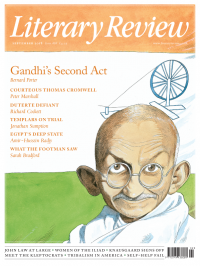David Patrikarakos
Digital Dystopia?
Future Politics: Living Together in a World Transformed by Tech
By Jamie Susskind
Oxford University Press 514pp £20
The People vs Tech: How the Internet Is Killing Democracy (and How We Save It)
By Jamie Barlett
Ebury Press 256pp £8.99
Democracy Hacked: Political Turmoil and Information Warfare in the Digital Age
By Martin Moore
Oneworld 336pp £16.99
‘The future stalks us,’ begins Jamie Susskind’s rigorous and thoughtful book Future Politics: Living Together in a World Transformed by Tech (Oxford University Press 514pp £20). The future, he argues, is coming – and fast. The reason the danger is so pressing is that, as Susskind correctly states, ‘while time passes linearly, many developments in digital technology are occurring exponentially’. Put simply: we are always behind the tech. As soon as we have just about learned to grapple with, say, social media, the perfect medium for mendacity, we are on to the next challenge. It is these ‘challenges’ that Susskind sets out to explore with commendable intellectual breadth as he considers the impact of technology on power, liberty, democracy and justice.
We already live in a world where Amazon’s algorithms, more than any human or media outlet, decide what books the world reads. With machine learning advancing, will we hand over the administration of justice to machines or codes that can dispense it more effectively?
He laments – as C P Snow did over half a century earlier in The Two Cultures and the Scientific Revolution – ‘the gulf between the arts and the sciences’. Susskind understands the danger of a world where coders and engineers are unequipped to think about the systemic consequences of their work while social scientists and political theorists are ignorant of the full social and political import of developments in technology across the world.
‘Staggering new achievements in science and technology are transforming the way we live together,’ he tells us, and ‘we aren’t ready’. AI, genetic engineering and nanotechnology are just some of the inventions that could alter our very biology. What, then, of politics? It’s a tough one. But in

Sign Up to our newsletter
Receive free articles, highlights from the archive, news, details of prizes, and much more.@Lit_Review
Follow Literary Review on Twitter
Twitter Feed
‘The Second World War was won in Oxford. Discuss.’
@RankinNick gives the question his best shot.
Nicholas Rankin - We Shall Fight in the Buttery
Nicholas Rankin: We Shall Fight in the Buttery - Oxford’s War 1939–1945 by Ashley Jackson
literaryreview.co.uk
For the first time, all of Sylvia Plath’s surviving prose, a massive body of stories, articles, reviews and letters, has been gathered together in a single volume.
@FionaRSampson sifts it for evidence of how the young Sylvia became Sylvia Plath.
Fiona Sampson - Changed in a Minute
Fiona Sampson: Changed in a Minute - The Collected Prose of Sylvia Plath by Peter K Steinberg (ed)
literaryreview.co.uk
The ruling class has lost its sprezzatura.
On porky rolodexes and the persistence of elite reproduction, for the @Lit_Review: